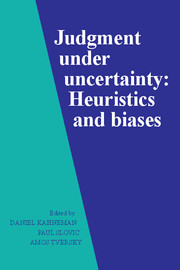Book contents
- Frontmatter
- Contents
- List of contributors
- Preface
- Part I Introduction
- Part II Representativeness
- Part III Causality and attribution
- Part IV Availability
- Part V Covariation and control
- Part VI Overconfidence
- Part VII Multistage evaluation
- Part VIII Corrective procedures
- Part IX Risk perception
- Part X Postscript
- 34 On the study of statistical intuitions
- 35 Variants of uncertainty
- References
- Index
35 - Variants of uncertainty
Published online by Cambridge University Press: 05 May 2013
- Frontmatter
- Contents
- List of contributors
- Preface
- Part I Introduction
- Part II Representativeness
- Part III Causality and attribution
- Part IV Availability
- Part V Covariation and control
- Part VI Overconfidence
- Part VII Multistage evaluation
- Part VIII Corrective procedures
- Part IX Risk perception
- Part X Postscript
- 34 On the study of statistical intuitions
- 35 Variants of uncertainty
- References
- Index
Summary
Analyses of uncertainty in philosophy, statistics, and decision theory commonly treat all forms of uncertainty in terms of a single dimension of probability or degree of belief. Recent psychological studies of judgment under uncertainty have often followed this tradition and have focused on the correspondence of intuitive judgments to the standard logic of probability (Einhorn & Hogarth, 1981; Nisbett & Ross, 1980; Slovic, Fischhoff, & Lichtenstein, 1977; Chapter 34). A comprehensive psychological perspective on uncertainty, however, reveals a variety of processes and experiences, which include such basic mechanisms as habituation to repeated stimulation in a single neuron and such complex activities as the evaluation of scientific hypotheses.
In this chapter we sketch some extensions of the range of observations that are normally considered in psychological analyses of judgments under uncertainty. Two levels of responses to uncertainty are discussed. We first describe some basic processes of expectation and surprise in perception, which can be considered the precursors of subjective probability. We then turn to a phenomenological examination, in which we distinguish internal from external attributions of uncertainty and sketch four modes of judgment that people may adopt in assessing uncertainty.
Information
- Type
- Chapter
- Information
- Judgment under UncertaintyHeuristics and Biases, pp. 509 - 520Publisher: Cambridge University PressPrint publication year: 1982
Accessibility standard: Unknown
- 55
- Cited by
